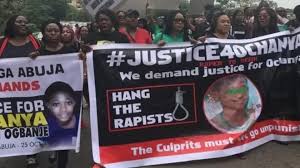
Daniel Otera
Seven years after the death of 13-year-old Ochanya Ogbanje, public anger has once again erupted across Nigeria, with child rights activists, civil society groups, and ordinary citizens demanding justice not just for her, but for thousands of children facing sexual violence in silence.
The renewed protests in Lagos, Abuja, and Makurdi this week came amid growing frustration over the perceived failure of the justice system to hold perpetrators accountable, despite clear evidence of widespread abuse.
Placards bearing inscriptions such as “Justice for Ochanya,” “Stop Child Molestation,” and “Protect Our Children, Punish Paedophiles” filled the streets of Ikeja, where protesters converged at the Lagos State House of Assembly.
Ochanya’s story began in 2012 when she was sent from her rural home in Ogene-Amejo, Benue State, to live with her aunt, Mrs. Felicia Ogbuja, in Ugbokolo. Her parents had hoped she would receive a better education there. But that decision turned into a nightmare.
According to court records and medical reports, Ochanya was repeatedly sexually abused by her guardian’s husband, Andrew Ogbuja, a lecturer at Benue State Polytechnic, and their son, Victor. Years of abuse left the young girl with a devastating medical condition known as vesico-vaginal fistula (VVF) a tear between the bladder and vagina often caused by trauma.
By October 2018, at just 13 years old, she was dead.
Her death sparked national outrage and gave birth to the hashtag #JusticeForOchanya, which trended across social media platforms for months, forcing the authorities to act.
Despite the public outcry, the legal process that followed has been painfully slow and controversial.
Read Also: Lagos’s Disturbing Figures: Tackling the Rise in Child Abuse and Violence Against Children
In 2022, the Benue State High Court acquitted Andrew Ogbuja of rape and culpable homicide, citing contradictory autopsy reports and weak prosecution evidence. His wife, Felicia, however, was convicted by the Federal High Court for negligence and failure to protect a minor under her care — a charge under the National Agency for the Prohibition of Trafficking in Persons (NAPTIP) Act.
Victor, the second accused, has remained at large since 2018.
Legal experts have described the case as a tragic illustration of Nigeria’s weak justice system. In a 2024 report by the Federal Ministry of Justice and NAPTIP, less than 10 per cent of reported sexual offences in Nigeria lead to convictions.
Data from the National Bureau of Statistics (NBS) and UNICEF Nigeria reveal that one in four Nigerian girls experiences sexual violence before the age of 18. Between May 2023 and April 2024 alone, more than 1.4 million Nigerians reported experiencing sexual offences including rape, harassment, and defilement.
In Lagos State, records from the Domestic and Sexual Violence Agency (DSVA) show that between August 2022 and July 2023, 5,624 cases of sexual and gender-based violence were documented with many involving minors.
Yet, child rights groups say these numbers only represent a fraction of reality, as most cases never make it to court.
“We cannot keep silent while children continue to suffer in the hands of abusers,” said Aderonke Oyelakin, Lagos State Coordinator of the Child Protection Network, during Thursday’s protest. “Ochanya is no longer alive, but there are other children going through the same horror. Some parents tell them to keep quiet until they die. We are asking, which child is next?”
Among those who joined the protest was actress and humanitarian Sunshine Rossman, who leads the She Foundation.
“I am here for Ochanya and for all the young girls and boys who are constantly being molested,” she said. “Many of these perpetrators are people we know relatives, friends, neighbours yet we cover up for them. Nigerians must learn to speak up even when it doesn’t affect them directly. Tomorrow, it could be your daughter or your sister.”
Rossman also called on the government to introduce comprehensive sex education in schools and encourage open communication between parents and children about consent and body boundaries.
Following nationwide pressure, the Benue State Government announced plans to reopen Ochanya’s case, a move many see as a test of political will.
A senior official in the state’s Ministry of Justice confirmed that the government was reviewing “new evidence and procedural lapses” in the previous prosecution.
“This case is symbolic,” the source said. “It represents every child failed by the system. If the government cannot deliver justice for Ochanya, then it has failed every victim of child abuse in Nigeria.”
Nigeria’s Violence Against Persons (Prohibition) Act of 2015 and the Child Rights Act of 2003 both criminalise sexual violence against minors and provide for life imprisonment in aggravated cases. However, 12 states in northern Nigeria have yet to domesticate the Child Rights Act, limiting its enforcement.
According to a 2024 study by UN Women Nigeria, the absence of child-friendly courts, inadequate forensic facilities, and cultural stigma are major reasons why sexual violence cases collapse in court.
Beyond the courtroom, Ochanya’s story forces a deeper reflection on how Nigeria treats its most vulnerable. The fight for justice is no longer just about one girl it is about every child whose pain is buried under cultural silence and bureaucratic neglect.
The protests in Lagos are part of a growing nationwide movement demanding structural reform from community policing of child abuse to better rehabilitation for survivors.
As one placard boldly read: “Justice delayed is justice denied and Nigeria has denied too many children for too long.”
Civil society groups have urged the Federal Government to establish a National Sex Offenders Registry that is transparent and accessible to the public. They also want stiffer penalties for institutions and guardians who fail to report abuse.
For many, Ochanya’s death must not end as just another trending hashtag.
“She died at 13,” said one protester quietly, holding a candle at the vigil. “But if her story forces this country to protect even one child, then she did not die in vain.”
